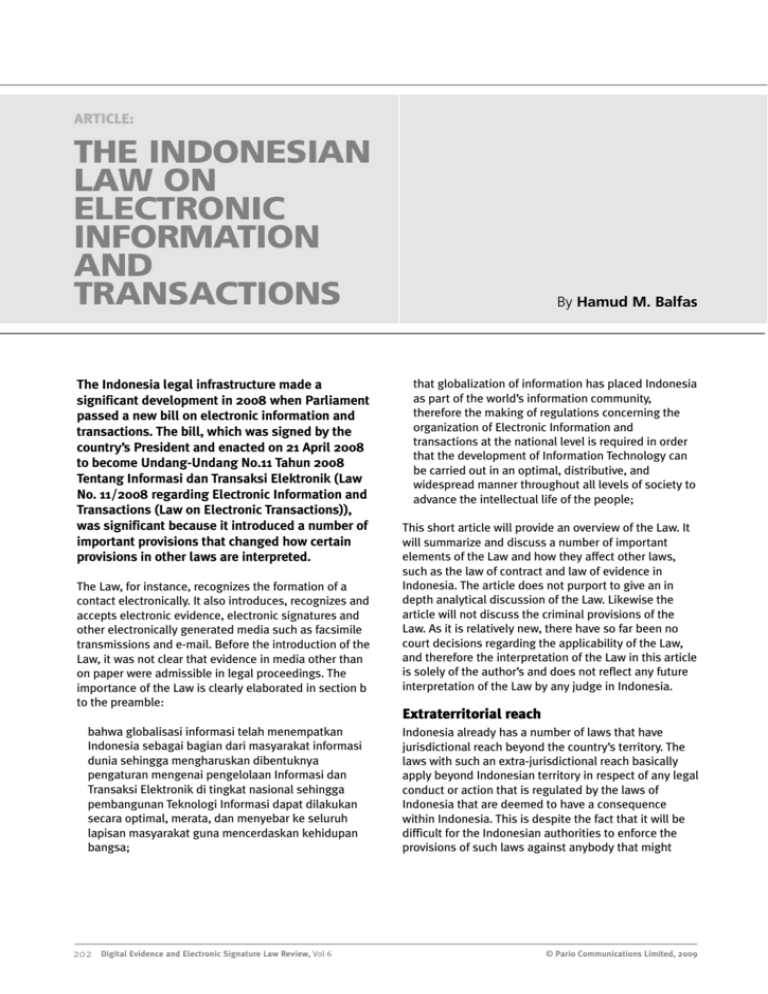the indonesian law on electronic information and - SAS
advertisement

ARTICLE: THE INDONESIAN LAW ON ELECTRONIC INFORMATION AND TRANSACTIONS The Indonesia legal infrastructure made a significant development in 2008 when Parliament passed a new bill on electronic information and transactions. The bill, which was signed by the country’s President and enacted on 21 April 2008 to become Undang-Undang No.11 Tahun 2008 Tentang Informasi dan Transaksi Elektronik (Law No. 11/2008 regarding Electronic Information and Transactions (Law on Electronic Transactions)), was significant because it introduced a number of important provisions that changed how certain provisions in other laws are interpreted. The Law, for instance, recognizes the formation of a contact electronically. It also introduces, recognizes and accepts electronic evidence, electronic signatures and other electronically generated media such as facsimile transmissions and e-mail. Before the introduction of the Law, it was not clear that evidence in media other than on paper were admissible in legal proceedings. The importance of the Law is clearly elaborated in section b to the preamble: By Hamud M. Balfas that globalization of information has placed Indonesia as part of the world’s information community, therefore the making of regulations concerning the organization of Electronic Information and transactions at the national level is required in order that the development of Information Technology can be carried out in an optimal, distributive, and widespread manner throughout all levels of society to advance the intellectual life of the people; This short article will provide an overview of the Law. It will summarize and discuss a number of important elements of the Law and how they affect other laws, such as the law of contract and law of evidence in Indonesia. The article does not purport to give an in depth analytical discussion of the Law. Likewise the article will not discuss the criminal provisions of the Law. As it is relatively new, there have so far been no court decisions regarding the applicability of the Law, and therefore the interpretation of the Law in this article is solely of the author’s and does not reflect any future interpretation of the Law by any judge in Indonesia. Extraterritorial reach bahwa globalisasi informasi telah menempatkan Indonesia sebagai bagian dari masyarakat informasi dunia sehingga mengharuskan dibentuknya pengaturan mengenai pengelolaan Informasi dan Transaksi Elektronik di tingkat nasional sehingga pembangunan Teknologi Informasi dapat dilakukan secara optimal, merata, dan menyebar ke seluruh lapisan masyarakat guna mencerdaskan kehidupan bangsa; 202 Digital Evidence and Electronic Signature Law Review, Vol 6 Indonesia already has a number of laws that have jurisdictional reach beyond the country’s territory. The laws with such an extra-jurisdictional reach basically apply beyond Indonesian territory in respect of any legal conduct or action that is regulated by the laws of Indonesia that are deemed to have a consequence within Indonesia. This is despite the fact that it will be difficult for the Indonesian authorities to enforce the provisions of such laws against anybody that might © Pario Communications Limited, 2009 THE INDONESIAN LAW ON ELECTRONIC INFORMATION AND TRANSACTIONS have conducted the action outside Indonesia. The laws that have jurisdictional reach include Law No. 8/1995 regarding Capital Market and Law No. 7/1992 regarding Banking (as amended by Law No. 10/1998). These two laws basically regulate the distribution of securities and banking products either to Indonesian citizens or within Indonesian territory.1 However, and unlike the capital market and banking laws discussed above, the Law on Electronic Transactions expressly stipulates the nature of its extra territorial jurisdiction, in that it expressly stipulates that it has extra territorial jurisdiction. Article 2 of the Law states that: Undang-Undang ini berlaku untuk setiap Orang yang melakukan perbuatan hukum sebagaimana diatur dalam Undang-Undang ini, baik yang berada di wilayah hukum Indonesia maupun di luar wilayah hukum Indonesia, yang memiliki akibat hukum di wilayah hukum Indonesia dan/atau di luar wilayah hukum Indonesia dan merugikan kepentingan Indonesia. This Law shall apply to any Person who commits legal acts as governed by this Law, both within the jurisdiction of Indonesia and outside the jurisdiction of Indonesia, having legal effect within the jurisdiction of Indonesia and/or outside the jurisdiction of Indonesia and detrimental to the interest of Indonesia. Such an express provision of the Law is basically an embodiment of the nature of the electronic transaction itself, which is global and borderless in its nature. The elucidation of article 2 further elaborates this jurisdictional reach nature of the Law, and states that: Undang-Undang ini memiliki jangkauan yurisdiksi tidak semata-mata untuk perbuatan hukum yang berlaku di Indonesia dan/atau dilakukan oleh warga negara Indonesia, tetapi juga berlaku untuk perbuatan hukum yang dilakukan di luar wilayah hukum (yurisdiksi) Indonesia baik oleh warga negara Indonesia maupun oleh warga negara asing atau badan hukum Indonesia maupun badan hukum asing yang memiliki akibat hukum di Indonesia, mengingat 1 The extraterritorial nature of the Capital Market Law may be derived from the provisions of Article 1 section 15 which defines the term ‘public offering’. The term ‘offering’ is defined to include: An ‘Offering’ within the territory of Indonesia © Pario Communications Limited, 2009 pemanfaatan Teknologi Informasi untuk Informasi Elektronik dan Transaksi Elektronik dapat bersifat lintas teritorial atau universal. Since Information Technology usage for Electronic Information and Electronic Transactions is crossterritorial or universal in nature, this law shall have jurisdiction over legal acts applicable not only in Indonesia and/or committed by Indonesian citizens, but also applicable to legal acts committed outside jurisdiction of Indonesia by both Indonesian citizens and foreign citizens or Indonesian legal entities and foreign legal entities having legal effect in Indonesia. As for the term ‘detrimental to the interest of Indonesia’ as specified in article 2, the elucidation of article 2 defines it as follows: Yang dimaksud dengan ‘merugikan kepentingan Indonesia’ adalah meliputi tetapi tidak terbatas pada merugikan kepentingan ekonomi nasional, perlindungan data strategis, harkat dan martabat bangsa, pertahanan dan keamanan negara, kedaulatan negara, warga negara, serta badan hokum Indonesia. Detrimental to the interest of Indonesia’ shall include but not limited to detrimental to the interests of national economy, strategic data protection, nation’s dignity and degree, state defense and security, sovereignty, citizens as well as Indonesian legal entities. The effect on contract law and evidence The Indonesian law regarding contracts is laid down in Chapter 2 of Book III of the Indonesian Kitab UndangUndang Hukum Perdata (Civil Code). The Civil Code was promulgated during the Dutch colonial era more than 150 years ago, and to date no substantial improvements have been made to this Chapter 2. Book III of the Civil Code is entitled (in Dutch) ‘Verbintenissen’ (‘Binding Engagements/Obligations’) and provides that a binding engagement can arise from an agreement or from the law. Chapter 2 is entitled ‘Binding Engagements Arising from Contracts or Agreements’ and consists of four parts: (i) General Provisions, (ii) Conditions for the includes both domestic and foreign Issuers, as well as offerings to both domestic and foreign investors, in compliance with Disclosure Principles. Regulations regarding Public Offerings also apply to offerings by domestic Issuers to Indonesian citizens abroad. This provides necessary protection to Indonesian investors overseas in the case of Securities offered by domestic Issuers. Digital Evidence and Electronic Signature Law Review, Vol 6 203 THE INDONESIAN LAW ON ELECTRONIC INFORMATION AND TRANSACTIONS Existence of a Valid Contract, (iii) Consequences of a Contract, and (iv) Interpretations of Contracts. Book III also contains provisions for specific contracts such as contracts on sale and purchase, on exchange of goods, on renting, hire purchase, guaranty, and such like. Indonesian contract law embraces the principle of ‘freedom to contract’ which basically gives the parties who wish to enter into a contract, the freedom to provide whatever provisions they would like to specify in the contract that they are entering into. The parties may thus create whatever terms and conditions in their contract, provided that such terms and conditions are not contradictory to public policy and the moral standards of society. Based on the principle of freedom of contract, the parties may also deviate from what is provided for in Book III of the Civil Code, unless specifically stated otherwise. The provisions in Book III of the Civil Code will only apply when the parties have not made a provision in their contract with respect to such matters. The provisions in Book III of the Civil Code are therefore considered to have a supplementary character and will apply to matters under a contract that the parties have not provided for in their contract. The above principle is also reflected in the first paragraph of article 1338 of the Civil Code, which provides that: Semua persetujuan yang dibuat sesuai dengan undang-undang berlaku sebagai undang-undang bagi mereka yang membuatnya. Persetujuan itu tidak dapat ditarik kembali selain dengan kesepakatan kedua belah pihak, atau. karena alasan-alasan yang ditentukan oleh undang-undang. All legally executed agreements shall bind the individuals who have concluded them by law. They cannot be revoked otherwise than by mutual agreement, or pursuant to reasons which are legally declared to be sufficient. The Civil Code uses the word ‘all’ in the above wording to stress that agreements can be concluded that contain whatever legal provisions that are desired, and once it is agreed, the agreement will be binding on those who have entered into it and they shall abide by it as if the agreement is in itself a law. In other words, in an 2 Professor R. Subekti, Hukum Perjanjian, (Penerbit PT Intermasa, Jakarta, 1985), 14. 204 3 4 Articles 17 and 18. Article 20 section 1. Digital Evidence and Electronic Signature Law Review, Vol 6 agreement the parties can make a law for themselves. Some provisions in the Civil Code will apply to matters under the agreement when and in the event the parties fail to create provisions with respect to such matters in the agreement that they have made.2 Another important principle in Indonesian contract law is the principle of good faith. Article 1338 (3) of the Civil Code stipulates that ‘Persetujuan harus dilaksanakan dengan itikad baik’ ‘agreements must be implemented in good faith.’ This means that all agreements must be implemented and performed with due observance of the norms of reasonableness and good morals. Therefore, objective standards must be used to evaluate the implementation of agreements. As the law of contract (as stipulated in the Civil Code) constitutes a general principle of contract of law in Indonesia, the Law on Electronic Transactions embraces principles that have been defined in the Civil Law. These principles include the principle of good faith and the freedom of contract.3 The Law on Electronic Transactions differs, however, in the way it stipulates the way the offer and the acceptance in a contract is concluded between the parties. For the purpose of this, the Law provides that unless provided otherwise by parties, electronic transactions shall occur at the time the transaction offer sent by sender or originator has been received and accepted by recipient or addressee.4 The elucidation of article 20 further states that electronic transactions shall occur at the time of the agreements between parties, which can be in the form of, amongst other things, verification of data, identity, and personal identification number or password. Likewise, and as the relation between the parties in an electronic transaction is based on an electronic system, the Law on Electronic Transactions requires that the parties in an electronic transaction is required to agree on electronic systems.5 As an electronic transaction can be conducted directly between the sender and the recipient or through their proxy or electronic agents, the Law stipulates different legal effects on the relationship of the parties, as follows, in accordance with the provisions of article 21(2): (2) Pihak yang bertanggung jawab atas segala akibat hukum dalam pelaksanaan Transaksi Elektronik sebagaimana dimaksud pada ayat (1) diatur sebagai berikut: 5 Article 19. © Pario Communications Limited, 2009 THE INDONESIAN LAW ON ELECTRONIC INFORMATION AND TRANSACTIONS One important feature of the Law on Electronic Transactions is its unprecedented effect on the Indonesian law of evidence. a. jika dilakukan sendiri, segala akibat hokum dalam pelaksanaan Transaksi Elektronik menjadi tanggung jawab para pihak yang bertransaksi; b. jika dilakukan melalui pemberian kuasa, segala akibat hukum dalam pelaksanaan Transaksi Elektronik menjadi tanggung jawab pemberi kuasa; atau c. jika dilakukan melalui Agen Elektronik, segala akibat hukum dalam pelaksanaan Transaksi Elektronik menjadi tanggung jawab penyelenggara Agen Elektronik. (2) Parties responsible for any legal effect in the conduct of Electronic Transactions as intended by section (1) shall be regulated as follows: a. if conducted in person, any legal effect in the conduct of Electronic Transactions shall become the responsibility of parties to a transaction; b. if conducted by proxy, any legal effect in the conduct of Electronic Transactions shall become the responsibility of the grantors of the proxy; or c. if conducted by Electronic Agents, any legal effect in the conduct of Electronic Transactions shall become the responsibility of Electronic Agent providers. One important feature of the Law on Electronic Transactions is its unprecedented effect on the Indonesian law of evidence. The Indonesian law of evidence is contained in book IV of the Civil Code and 6 7 8 Article 1866 of the Civil Code and Article 164 of the Civil Procedural Law. Supreme Court letter No. 39/TU/88/102/Pid dated 14 January 1988. Article 5 section 1 of the Law stipulates that: ‘Informasi Elektronik dan/atau Dokumen © Pario Communications Limited, 2009 the law of civil procedures, which was also enacted during the Dutch colonial period. In essence, the law of evidence only recognizes written and oral evidence.6 Under the prevailing law of evidence, evidence can only be presented in original physical form or orally. As the result, copies of documents and electronic evidence was not recognized under the Indonesian law of evidence before the introduction of the Law on Electronic Transactions. This created a number of difficulties where parties entered into a contract or transaction electronically and then had a dispute over the contract. The Indonesia Supreme Court, for instance, have only in recent years allowed the parties in a dispute to present analogue evidence in the form of microfilm.7 The Introduction of Law on Electronic Transactions has now changed the legal landscape. Electronic evidence is now recognized legally for the first time.8 As the Law also embraces a broadest form of electronic information and electronic documents (including any reproduction of such electronic information and document), the recognition of the Law on electronic evidence enables any form of document to be considered as evidence under the Law. For instance, article 1(4) defines the term ‘electronic record’ to include: adalah setiap Informasi Elektronik yang dibuat, diteruskan, dikirimkan, diterima, atau disimpan dalam bentuk analog, digital, elektromagnetik, optikal, atau sejenisnya, yang dapat dilihat, ditampilkan dan/atau didengar melalui Komputer atau Sistem Elektronik, termasuk tetapi tidak terbatas pada tulisan, suara, gambar, peta, rancangan, foto atau sejenisnya, huruf, tanda, angka, Kode Akses, simbol atau perforasi yang memiliki makna atau arti atau dapat dipahami oleh orang yang mampu memahaminya. Elektronik dan/atau hasil cetaknya merupakan alat bukti hukum yang sah’ ‘Electronic Information and/or Electronic Records and/or the printouts thereof shall be lawful means of proof.’ Digital Evidence and Electronic Signature Law Review, Vol 6 205 THE INDONESIAN LAW ON ELECTRONIC INFORMATION AND TRANSACTIONS means any Electronic Information that is created, forwarded, sent, received, or stored in analog, digital, electromagnetic, optical form, or the like, visible, displayable and/or audible via Computers or Electronic Systems, including but not limited to writings, sounds, images, maps, drafts, photographs or the like, letters, signs, figures, Access Codes, symbols or perforations having certain meaning or definition or understandable to persons qualified to understand them. Separately, Article 1(1) also defines the term ‘electronic information’ as: adalah satu atau sekumpulan data elektronik, termasuk tetapi tidak terbatas pada tulisan, suara, gambar, peta, rancangan, foto, electronic data interchange (EDI) surat elektronik (electronic mail), telegram, teleks, telecopy atau sejenisnya, huruf, tanda, angka, Kode Akses, simbol, atau perforasi yang telah diolah yang memiliki arti atau dapat dipahami oleh orang yang mampu memahaminya. one cluster or clusters of electronic data, including but not limited to writings, sounds, images, maps, drafts, photographs, electronic data interchange (EDI), electronic mails, telegrams, telex, telecopy or the like, letters, signs, figures, Access Codes, symbols or perforations that have been processed for meaning 206 Digital Evidence and Electronic Signature Law Review, Vol 6 or understandable to persons qualified to understand them. Concluding remarks The introduction of the Law on Electronic Transactions into the Indonesian legal system has changed the country’s legal landscape. The new law has had a significant effect on how evidence is presented, and how contracts are entered into. Contracts entered into electronically are now legally recognized. Now it is for lawyers and judges in Indonesia to begin to understand the complexities and characteristics of electronic evidence. In addition, the Law also presents unprecedented challenges to Indonesian judges and other law enforcement agencies in general on how to enforce the extra territorial nature of the Law. © Hamud M. Balfas, 2009 Hamud M. Balfas is a lawyer at Ali Budiardjo Nugroho Reksodiputro in Jakarta. He wrote a book on Indonesian Capital Market Law Hukum Pasar Modal Indonesia, (PT Tatanusa, Jakarta, 2006). A rapporteur at the National Law Commission, he previously served as Head of Surveillance Division at the Jakarta Stock Exchange. hbalfas@abnrlaw.com © Pario Communications Limited, 2009





